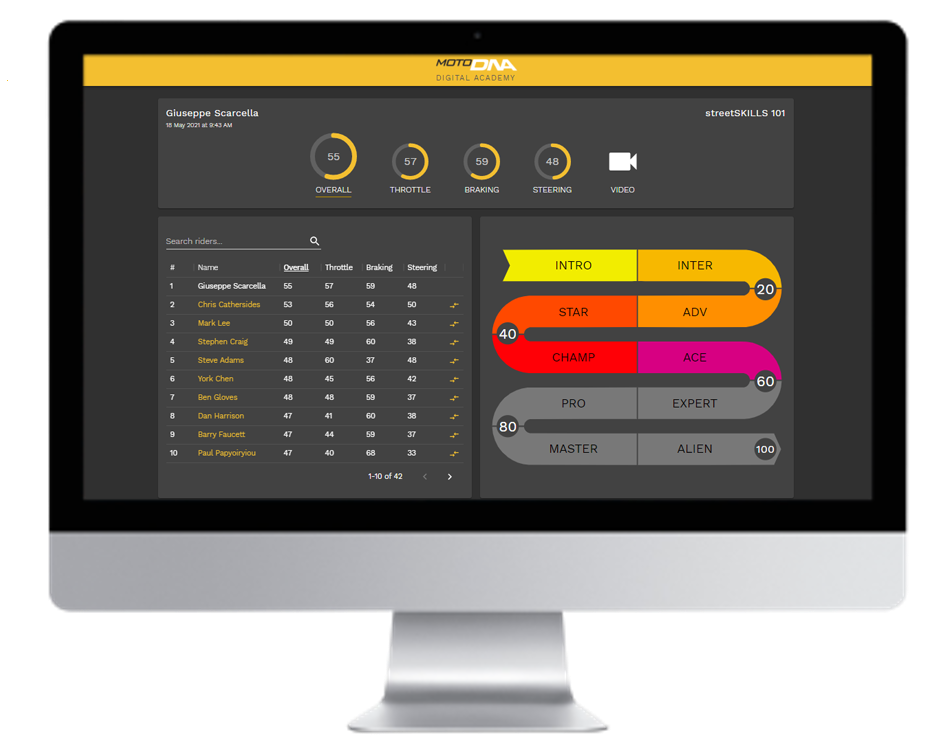Rider trainers have been in the spotlight recently after Valentino Rossi acknowledged his new coach, former World Champion Luca Cadalora, as a main contributor to his dominant form at the recent Spanish MotoGP.
Rossi was a notorious poor qualifier and equally not great off the line, spending much of the race trying to catch the front-runners.
In Jerez, Vr46 qualified on pole and achieved his first flag-to-flag race win at 37 years old.
So why does someone with alien like riding talent, great riding genes, huge work ethic and amazing motivation need a coach?
The nine-time word champion says it’s a mistake to believe you know everything. The key is to be open to learning new things.
There are many reasons Rossi is the GOAT, but his ability to keep learning and continuously adapt to new threats is surely his greatest trait.All rider’s can learn from this modesty.
Rossi’s was honest enough to look at his weaknesses and didn’t let ego get in the way of getting help from a riding coach.
“But Rossi is a racer; I ride on the road and don’t need a coach”, I hear you say, or perhaps you are happy to learn from your own errors.
Learning by your mistakes is fine with most things in life, but making a blunder riding a motorcycle on the open road could be your last mistake.
To ride safely on the road we need a mix of good skill, road-craft and the correct attitude.
The highest skilled riders are racers and while road riders don’t need to get their elbow down we can learn a lot from racing skill.
Coaching helps riders reach their full potential, whether that’s optimising your road-craft for cruising the mountain twistie’s or equipping you with the skills to ride your adventure bike across the desert.
So, what does a good coach look like?
Is it your mate on Facebook; that’s a bit quicker and more confident than you on the road?
The first question you should ask is what’s their credibility.
Cadalora’s has clearly amazing credibility, with 3 World Championships and Rossi also speaks of his fellow Italians great passion and abundant experience.
However a good motorcycle coach also has to consider the safety element, especially with inexperienced riders.
We should also learn by the mistakes of others.
Take the positive from a bad situation and improve safety, just like the aviation industry.We should talk about crashes and how they occur.
Too often we see speed blamed as the reason.
Certainly inappropriate speed cause’s plenty of accidents but inaccurate reporting often fails to identify the root cause of a crash.
Too often riders look directly at the vehicle, panic and inadvertently steer their bike head on with a poor outcome.
By talking about scenarios with an experienced coach we can understand how to correctly deal with a high-risk situation and implement a training plan where you can practise the correct techniques until they become intuitive.
Part of a coach’s role is to help riders understand the skills they need to achieve their goals and then match these skills to a series of stretch-goals that are challenging, but which are possible to achieve safely; with that riders current skill level.
However a good coach also needs a good student. Being honest with your riding level is key.A great example of honesty is motoDNA student Ash DeBakker in the photo below.
Ash was a virtual riding rookie and through hard work and dedication has progressed from a novice street rider through to superbike racing in just one year.
It’s also useful to think of your riding level on a scale.
If we consider riding skill on a scale of zero to 100, a new rider would obviously be at the bottom of the scale at say around 5 where as Rossi, Marquez, et al will be at 100.
What’s you riding level, honestly?
About the Author: Mark McVeigh
Data Driven
Developed from thousands of riders at the motoDNA Motorcycle Training, our algorithms measure, grade and train motorcycle riders.
Objective
No more guessing, data sensor fusion combined with our algorithms deeply understand rider behaviour.
Towards Zero
Our urgent and ambitious aim is to empower the motorcycle community to take back control towards zero.


